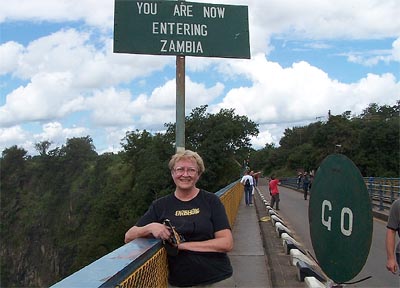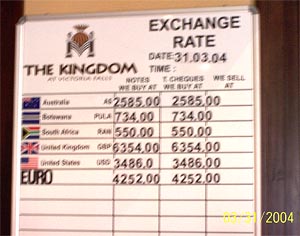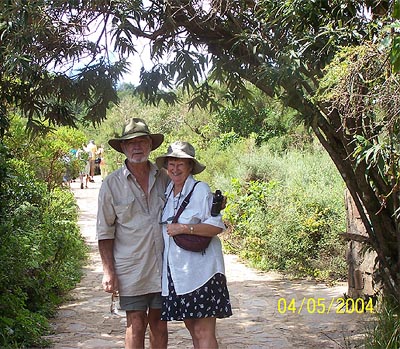|
Zimbabwe
- The Death of a Nation
By now, most people who keep up on daily events/current affairs
of international news know about the current crisis in Zimbabwe:
Hyper – inflation at 1,000% a year. Aids/HIV at 20% of the
population, with a projected orphanage rate of 90% by 2010. Unemployment
at 80%, an aged dictator clinging to power ruthlessly by using
genocide to control the population from uprising. According to
the U.N., the average life span of a Zimbabwean male is 37 years,
and a female 34 years. This is the lowest in the world.
Most of these problems originated after the 2000 election
poll showed that President Mugabe was headed for defeat, mainly
because of failed promises to redistribute white owned land to
the majority of the black landless masses after the 1980 victory
of independence from colonial British rule of the country then
known as Rhodesia. Mugabe began a vicious campaign of land evictions
without compensation, removing by threats, intimidations and
violence white farmers from their farms, and refusing to allow
remaining farmers to plant crops. Almost immediately whites began
leaving Zimbabwe in droves. Their farms fell into neglect as
the blacks that took over their farms had no experience or knowledge
on commercial farming. A large majority of the farms taken over
by blacks went to friends and allies of Mugabe, and after one
or two years of profitable farming ended with all profits being
sucked out of the farm and nothing put back in like fertilizer
or new seeds, the farm would be re-allocated to landless blacks
and the crony of Mugabe would take over another farm and exploit
it the same way.
As the economy deteriorated by these farmers leaving, and
other satellite businesses folding because of it, the World Bank
and other lending institutions refused to lend money to Zimbabwe,
Zimbabwe began defaulting on its petroleum purchases, and ultimately
struck a deal with Libya to exchange the choicest parcels of
land in Zimbabwe for gasoline. When that deal came to an end,
and Libya didn’t want any more land, and Zimbabwe had no
more oil, things really started getting tough. Educated blacks
also began leaving in droves, going to England, Australia, New
Zealand, U.S.A, and South Africa. Every year the flood of immigrants
has increased, and most will never return. Any brain drain of
this magnitude would ruin a country.
Two years ago, Jamie and I spent a month in South Africa with
a friend of ours, Corrine Gurry (the Wire Wizard lady), and my
mother and stepfather bused down from Zimbabwe to join us. We
rented a minivan and we drove all over SA, being tourists and
also taking care of business, selling beads, doing trunk shows
at bead stores, meeting AIDS co-operative workers who use beads
to make African dolls to resell, and also seeing members of my
family for the first time in 23 years, and in some instances
over 30 years. I had left Zimbabwe in 1980, five weeks after
black independence, and immigrated to the U.S. This was my chance
to visit a part of the world I loved and see family I hadn’t
seen in a very long time, and also show it off to my wife and
friends, who had never seen it. Although Jamie and I did not
go into Zimbabwe on this trip, Corrine did, as she was so close
to Victoria Falls and felt the political climate was so terrible
she might never get another chance to do so. She flew from Joberg
airport, and spent t he
night, touring Vic Falls and gambling in the casino. She reported
back to us that Zimbabwe appeared to be in severe financial trouble,
with paper money being printed on only one side, and not even
the shops or hotels would accept Zim dollars, and nothing to
buy with it. The hotel she stayed at was a 5 star hotel, absolutely
gorgeous, with one other couple staying there. It had a 350 occupancy
rating. It was deserted. That was in 2004. he
night, touring Vic Falls and gambling in the casino. She reported
back to us that Zimbabwe appeared to be in severe financial trouble,
with paper money being printed on only one side, and not even
the shops or hotels would accept Zim dollars, and nothing to
buy with it. The hotel she stayed at was a 5 star hotel, absolutely
gorgeous, with one other couple staying there. It had a 350 occupancy
rating. It was deserted. That was in 2004.
Corrine on the Zimbabwe/Zambia Bridge
below the Victoria Falls.
My parents who had joined us for the month long trip were
able to confirm everything Corrine saw. George, my stepfather,
had given Corrine $50,000 in Zimbabwean money to take with her,
and she gave it back when she returned, as she could find nothing
to buy. It was only valued at $15 US at that time.
 Now the unofficial rate of exchange
is $99,000 Zim dollars to $1US. Now the unofficial rate of exchange
is $99,000 Zim dollars to $1US.
A joke circulating around Zimbabwe currently is that a roll of
toilet paper costs $147,500 or $510 for 2 pieces. Zimbabwe’s
smallest denomination is $500. Why bother to buy toilet paper?
My mother and George had just sold their very successful auction
house in Bulawayo the year before, and were retired. They had
lots of money in the bank, they owned their house, had investments
generating income, and were fairly satisfied that they could
continue living in Zimbabwe regardless of the crisis continuing
in Zimbabwe and the deteriorating conditions around them. They
explained that they really had no choice…. they were both
born in Zimbabwe, all their friends were there, their money was
tied up in the country and could not be taken out, they loved
living there, and they could not get visas to live in South Africa
(nor would they want to, as that country was going the same way,
anyway) nor would they want to live in England, as they knew
no-one there and it was an alien life style for them. Having
been born and raised in Africa all their lives, they were African.
We left South Africa and came home to our own lives, and barely
a month later my mother contacted me to inform us they were penniless
because the trustees of their pension fund had embezzled all
their funds. Ultimately, they were able to retrieve half of their
funds back, but now their cushion was not quite so plump. They
still insisted they were OK.
Things got worse. From November 2005 until March 2006 I lost
contact with my parents(their emails bounced back and their phone
stopped working) so I had no idea things were so bad until communications
were restored in late March. My folks had been forced to sell
their last remaining asset, their house, to raise funds to buy
food so they could continue to live. George, who is 76 years
old, and retired, was working again to bring in money. My mother
could not find a job. She told us they had to make a chicken
last 8 meals. A loaf of bread (if you can find it in the store)
costs $80,000 (which equals $0.81 US). The price does not sound
so high in USD, but if we had to pay $80,000 we would be paying
a very high price, as $80,000 is $80,000. Most of the grocery
stores are closed or empty of food. There is no milk (as all
the cows have been slaughtered for food), there is no fish (no
one is commercially fishing as the price of petrol is too high
or you just can not buy it), all the farm animals have been killed
off for food (therefore no eggs). And it goes on. The last we
heard Mugabe opened up the National Parks for people to come
in and kill the wildlife for food, i.e. elephants, zebra, giraffe,
wildebeest, kudu, buffalo, lion, buck and whatever other animals
they can find.
Obviously the situation with my folks was not acceptable to
me, so I immediately contacted my congressman Dan Lungren, and
began an expedited visa application to obtain immigration visas
for my mother and stepfather. As we speak, they are packing essentials
and selling off the rest, so they can flee the country of their
birth, and live as refugees in South Africa with relatives until
their visas come through. We are all waiting for their Visas
to be approved by the USA. It should be August 2006. They will
have lost everything they spent a lifetime building. All their
friends had implored them to stay, because if they left, Zimbabwe
as they knew it would be no more. They listened, and stayed,
until now, with all those friends gone, they are some of the
last colonial people left in Zimbabwe. Bulawayo used to have
a colonial population of over 50,000 people, but now the walled
village my folks live in and are leaving forever has a population
of maybe 400. All pensioners, all over 65 years old. No children,
no young families. Zimbabwe is dying.
 My mother and stepfather. My mother and stepfather.
When mom and George arrive here in the States, they will have
a new life filled with love and hope. They look forward to working
with us in our warehouse, sorting, organizing, pulling orders,
telemarketing, selling beads, answering phones….as well
as fishing, barbecuing, living the good life, and touring the
country in our RV when we go on road trips selling beads. Hopefully,
when you next call in an order for beads, the voice you hear
will have a British accent, (besides mine) and it will mean my
folks arrived here safely.
In case you are interested, Britain, the original colonial
power that created Rhodesia, is doing nothing to help the aging
pensioners of Zimbabwe. Ireland, on the other hand, is doing
everything it can to repatriate all its people living in Zimbabwe
that want to resettle in Ireland. In a recent article in the
Sunday Times of Ireland, the Irish government under the Safe
Home program has repatriated 19 families to County Mayo, placing
them in new homes and giving them government assistance,ie, welfare.
All I can do is sponsor my parents to the USA, and then support
them. I am so glad I can do that. However, I have just recently
found out that the government will only issue a visa for my mother,
and not my stepfather. So they will have to separate if they
wish to immigrate here. At least legally. So although the original
plan is still a go, its back to the drawing board with regards
to George’s visa. We’ll find a way.
Zimbabwe’s loss, America’s gain.
Corrine Gurry can be contacted at www.the wirewizard.com
or by phone at (425) 941- 6559.
All photographs courtesy of Corrine Gurry Copyright 2004
   |